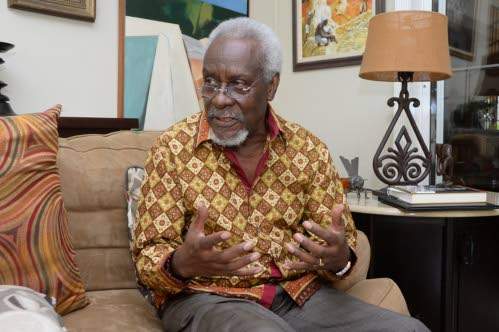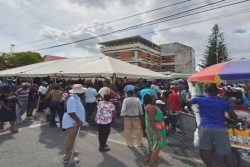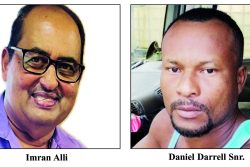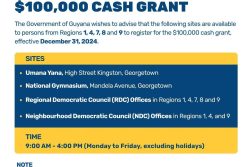(Jamaica Observer) Freed reggae artiste Buju Banton has been given a resounding vote of confidence by retired Jamaica Prime Minister PJ Patterson.
In a wide-ranging interview with the Jamaica Observer last week, Patterson, who launched the book My Political Journey, which chronicles his life up to when he retired as Jamaica’s sixth prime minister in 2006 following a 13-year unbroken stretch as Jamaica’s number one policymaker, said that Buju Banton had committed the crime, served the time, and should now be encouraged to prepare for life afterwards.
Buju (registered name Mark Anthony Myrie) returned to Jamaica last December 7 after serving almost seven years and five months of a 10-year and one-month sentence in a Georgia, USA prison for cocaine trafficking. The 45-year-old will be hosting his first major concert on March 16, controversially dubbed Long Walk To Freedom — a direct relation to the title of South African great Nelson Mandela’s autobiography Long Walk to Freedom published in December 1994, which highlighted, among other things, Mandela’s early life and his 27 years spent in prison on treason charges.

Put to Patterson that there existed a school of thought that Buju, as a convict, was being glorified by vast sections of the Jamaican landscape, the former president of the People’s National Party, chanted dissimilar sentiments.
“It’s not a question of glorification. He was convicted of a crime, he served his time. He wants to pursue his career in music. People found his message both compelling and alluring. As he himself said It’s not An Easy Road, so he is gone through a difficult part of the road,” Patterson stated.
“Buju has paid his penalty; there is no reason to condemn him in advance of anything he would do in future life. Certainly, when one reads all the evidence of the case it’s very clear that he succumbed to an inducement that he should have avoided. I think he himself would recognise that,” said Patterson, an eminent attorney-at-law who many believe did not show his true worth and potential in the courtroom because of the over 40 years that he spent in active Jamaican politics.
Jamaicans, Patterson thinks, should give the reggae singer the space to reshape his life and career, so that he can again become a positive influence on the Jamaican society.
“He is embarking on a resumption of his career and I think certainly all well-thinking Jamaicans would wish him well and would hope that he will carry a message that will help to inspire and uplift our people at this time,” Patterson suggested.
Patterson’s relationship with Jamaican music and artistes is legendary, the highlight of which was his management of the now defunct Skatalites band, which included some of the finest players of instruments that Jamaica has ever seen, among them the exceedingly popular trombonist Don Drummond — the most prominent, Tommy McCook, Roland Alphonso, Lloyd Knibb, among others.
He was also acutely fond of reggae/rock steady singer Delroy Wilson, whose 1971 hit song Better Must Come was used by the Michael Manley-led People’s National Party as its election theme song for the 1972 General Election for which Patterson served as the party’s campaign manager. Manley led the PNP to victory — allowing the party its first election triumph since Independence in 1962 although it had won elections under British rule in 1955 and 1955. The song was one of three ordered banned from the airwaves by then Prime Minister Hugh Shearer, but the ban was lifted shortly after Manley’s election victory.
Buju Banton was held by United States Drug Enforcement Administration agents during a drug bust in Miami in December 2009 and charged with, among other things, conspiracy to distribute, and possession of more than five kilogrammes of cocaine. Following a six-day trial in September 2010 the proceedings were declared a mistrial, as the jury was unable to reach a unanimous decision.
During the retrial, he was found guilty of conspiracy to possess with intent to distribute five or more kilos of cocaine, possession of firearm, and using communication material to assist with a drug trafficking offence. He was freed of the gun possession charge after it was dropped by the prosecution.
Buju’s return to Jamaica to resume his career has not been smooth-sailing for him, as some Jamaicans have objected to the label placed on his March 16 concert, and one Cabinet minister, Dr Christopher Tufton has suggested that he will not be in the expected sell-out crowd at National Stadium, which now accommodates 28,612 seats down from the original 29,542 it had when it was built in 1962, due to a subtraction of seats in the early 1990s under a renovation by the Institute of Sports.
The Gleaner newspaper last week quoted Professor Rupert Lewis, the well known historian, university lecturer and an authority on issues relating to National Hero Marcus Garvey, as objecting to any comparison of Buju’s prison release with that of Mandela when the doors to apartheid slowly began to close.
Tufton, the minister of health was reported by the publication as being angered by Buju’s failure to admit that he was wrong, and not pledging to guide the public in a direction that is contrary to drug abuse and drug trafficking.





